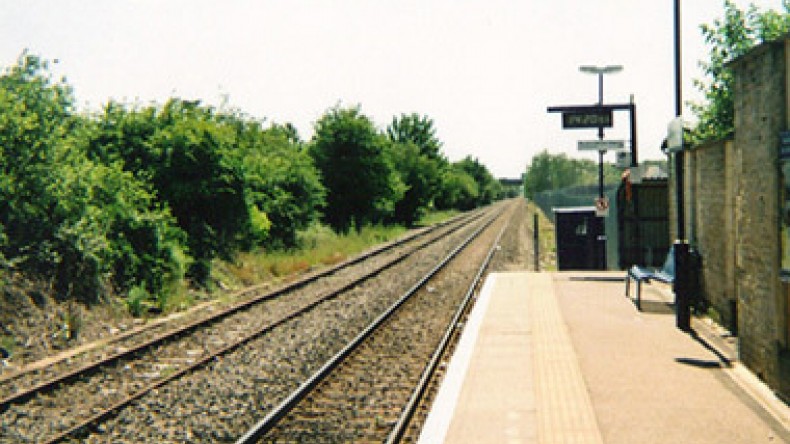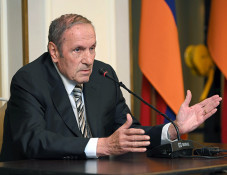
'Bomber Beeching': Undo vandalism & get Britain back on track
By Tony Gosling, RT
When the 50th anniversary of Britain’s ‘Beeching Report’ passed recently, magazines TV and radio all marked the occasion with retrospectives on the man who took a hatchet to half the 4,000-odd stations and 6,000 miles of Britain’s railways.
Back in 1963, Dr. Richard Beeching ripped the heart out of the world’s first and greatest railway network, but not one of those articles or programs mentioned that Beeching had no qualifications whatever for what was an accountant's job. His expertise was metallurgy and he'd just helped develop Britain's first atomic bomb.
Britain was the first country to industrialize and used her manufacturing muscle to become the great empire in the 19th century. It wasn’t just technology, like the invention of the steam engine, but a national policy of mass urbanization, transferring labor from agriculture to armaments and industry that put Britain ahead of the world. Mass evictions of the peasantry, known as enclosures, kept the wheels turning in the factories, William Blake’s ‘Dark Satanic Mills’ were filled with hundreds of thousands of homeless men with hungry families to house and feed, desperate for money for rent and food.
The wider empire was built on one particular invention, the railway. Moving coal, iron ore, wool and other raw materials as well as manufactured goods off the canals and uphill, down dale, cheaply and at speed gave Britain the edge as a massive shipbuilding program projected Queen Victoria’s power across the globe.
Even as Britain’s influence waned between the wars and the deliberate retreat from empire post WWII to make way for the US empire, the railways underpinned everything, moving people, goods and services, wherever they were needed and with a minimum of cost or fuss.
Across the Atlantic in the 1920s, though, people were about to be forced off the rails. Rockefellers’ Standard Oil Company teamed up with the Firestone Tire and Rubber Company, Mack Truck and General Motors automobile lobby to set up a bogus public transport firm National City Lines (NCL). Streetcar (tram) companies all over the US were taken over by NCL, which deliberately failed to maintain or replace worn out vehicles.
As streetcar lines collapsed, commuters were persuaded to buy automobiles that were rolling off the new production lines. Though the Standard Oil monopoly before it had been broken up by US antitrust laws, the Rockefeller shareholding family was finding new ways to extend its influence. Part of the NCL plan was to make future governments dependent on them for fuel tax revenue.
It was Nazi Germany that brought autobahns to the world, followed by US freeways and eventually European auto-routes and motorways in the 1960s. The agenda was threefold: shift travel away from unionized public transport, increase oil consumption – and therefore fuel and vehicle tax revenue - and finally to shift power, forever, into the hands of giant private oil companies like Exxon, Shell and BP.
This was a brave new fossil fuel led world where a dependency on energy would drive economic growth like never before. Governments and people alike would have to get used to the car. Public transport was way too fuel-efficient.
‘Beeching Report’: Myth v reality
A two-week rail strike just before the 1955 general election in Britain, which some now believe was deliberately provoked for political gain, brought the country to a halt. A 'state of emergency' was declared two weeks into June and the political classes were reminded just how reliant the nation was on the whim of transport unions.
Although the oil companies hadn't made it public, North Sea Oil had also been discovered, so in order to attract US investment into the ambitious offshore drilling program there was pressure from the oil lobby behind the scenes to open up a vast new market for petrol in the UK before releasing the cash to build the rigs. The new oil stream must not be allowed to depress the world oil price and demand for the petrodollar.
With consecutive governments, particularly Tory Transport Secretary Ernest Marples - who owned road-building firm Marples Ridgeway - the industrial lobby got its way. Passenger travel on the railways would in future subsidize bulk freight transport.
Even the newly-constructed state-of-the-art freight marshaling yards such as Whitemoor in Cambridgeshire were phased out, with the railways only taking container traffic or entire train loads of coal, ore, etc. for big business. One third of the rail network and half the stations had been closed.
Who was 'Ax Man' Dr. Richard Beeching?
Retired railway manager and author Ted Gibbins explained in his ‘Blueprints For Bankruptcy’ (1995) that the government’s British Transport Commission, later the British Railways Board too, had been consistently forced to keep fares artificially low by the government. The railways had been 'regulated' into making a loss year after year, when on a looser rein they could easily have turned a profit.
Both in 1963 and five decades later in 2013, commentators mused about Beeching’s credentials for the job of ‘reshaping’ Britain’s railways. And well they might. The plan was sold to public and politicians on two myths: those railways could no longer make money and that the door-to-door technology of the motor car was simply more convenient. Few seemed to envisage the long commutes and choked roads of today.
So it was with the stage set for the revolutionary motor car which was already sweeping across the United States and Germany that, out of nowhere, Beeching stepped on to the national stage with the grim news that Britain’s railways’ days were numbered.
In ‘Doctor Who? Atomic Bomber Beeching and His War on the Railways’ (2013 eBook), former editor of the British Aircraft Corporation’s magazine and MEP Richard Cottrell was the first to expose the Ax Man’s shadowy past.
Introduced to the British public simply as chairman of Imperial Chemical Industries (ICI) Beeching's link to explosives and nuclear weapons was never mentioned.
After a stint at the Woolwich Arsenal designing anti-tank weapons in World War II, Beeching had been moved on to the top secret ‘Tube Alloys’ project which was a cover for the development of the first British atomic weapons. At Royal Ordnance’s secret Fort Halstead base under the North Downs near Sevenoaks in Kent, Cottrell reveals, Beeching’s expertise in metallurgy made a key contribution to Britain’s rudimentary nuclear arsenal. The success of Britain’s 1950s atomic testing program brought Beeching the top job at ICI.
Qualifications in metallurgy and state-of-the-art explosives were not, you might think, the ideal qualification for a man whose job was to go through the accounts of British Railways with a fine toothed comb. No, the reason Beeching was hired was because the Conservative government had already decided his job was chop up the railways to make way for the motor car and they needed a figurehead that could keep his mouth shut.
With lines to be closed decided before Beeching's 'surveys' took place civil servants at the Department of Transport set about the simple but impish task of meddling with train timetables to make sure branch line trains left just before connecting trains arrived, nudging ever more passengers off the railways. Running costs of lines they wanted to close were grossly inflated, but nether rail unions nor public were allowed to see the figures to check them.
Where these fraudulent figures were exposed, as in the pamphlet ‘The Great Isle Of Wight Train Robbery’ (1969) press, public and political furor led to lines earmarked for closure being reprieved, but atomic Bomber Beeching ran a tight ship and exposures of his closure orders to scrutiny were few and far between.
A top secret de-industrialization plan was in place too. In late 1967, British Rail printed a secret 'Blue Book of Maps' with details of coalmines, steelworks etc. and associated rail lines secretly earmarked for closure over succeeding decades. Britain's devastating 1984/5 mine closure program and subsequent strike had been secretly anticipated by government and oil industry alike, decades before.
David Henshaw in his ‘Great Railway Conspiracy’ (1991) is one of the only analysts to have understood the secret Marples/Beeching axis untruth that rural rail, and urban rail outside London, could never pay its way, was simply propaganda cooked as a cover story, to take out the competition, by the oil industry and roads lobby.
Before addiction to oil & cars suffocates us all…
What hapless Britons are left with now after railway privatization in 1993 is the most expensive railway network in the world to travel on. In some places 10 times dearer than an equivalent journey in Austria, for example, a whole succession of racketeers from track and rolling stock owners to platform and turnstile operators draw their pound of flesh, from the great British public’s need to get around.
Banks and hedge funds own the rolling stock which is leased to deeply-indebted train operating companies such as First Group, which leases the bare minimum of carriages. This leaves trains jam-packed with standing-room only through large parts of the day. Even the minimum fares seem carefully pegged just above what it would cost in petrol to make a journey by car. A legacy, perhaps, of the energy industry's economic imperative, still nudging rail commuters to buy a car.
Along with electricity, gas, water, telecommunications, defense procurement, airports, the Royal Mail postal service, home care and housing, rail travel is just another government-approved scam. With commuters lining the pockets of overpaid bosses and shareholders, and exorbitant prices for what should be national utilities, turning a profit, at home or in business, becomes almost impossible.
Like energy and housing costs, travel costs by rail or car are slowly bankrupting families and small businesses alike. If policies don't change, all that will be left will be the boards of directors of the giant transnational corporations who have won the favor of what is now the ultimate power in the Western world, the banksters.
New Zealand discovered state railways work for public
Perhaps Britain's free post war socialist health service and social security miracle meant the British had it too good for too long? Perhaps because the London media is too close to the City's dark heart? Or perhaps it's just because all the main political parties have sold out? But the British public, it seems, will put up with anything. Not so in New Zealand, where privatization of the railways brought about a political storm as well as a split in the Labour party. It was re-nationalized in 2008.
Meanwhile, as the British government sinks ever deeper into the black it will be forced to consider the astounding success of Britain's only state run East Coast Main Line region which is not only top-rated in the UK for customer satisfaction but, unlike the privately run regions, has paid over a billion pounds into the treasury.
Nevertheless the government is determined to sell off the East Coast operating company two months before the general election in March 2015.
"Reprivatization of the East Coast Main Line defies all economic logic and is nothing less than an act of industrial vandalism," rail union leader Mick Cash told the Guardian in September this year.
It seems even with such a crystal clear example of the only state run railway being the best in the country the government still determined to overturn it and set up another racket with a Tory party donor in charge and hundreds of thousands of captive passengers as the victims.
It's a tough ask, but perhaps so close to a general election, and with Labour toying with the idea of rail nationalization, they, together with the commuting public could break the combined lobby of the oil industry, road lobby, media and banks? The railway racket has come to sum up everything about Britain's post 'swinging ’60s' decline, but perhaps, as in New Zealand the angry voice of commuters, squeezed in like sardines, and the cold hard economic successes of nationalization can turn things around?
Beeching's accidental stroke of genius
Bomber’s legacy, though, hasn’t been all betrayal. By accident his hatchet fell at the same time that Britain’s steam locomotives, kept on well beyond their continental networks because of Britain’s plentiful supplies of coal, were being replaced by diesels.
Those steam engines chuffed off to the overgrown lines that Beeching closed, and as a result many have been preserved. Now over 150 charitable steam railways, some of which are regular enough to be used by commuters, are dotted across the country on the old closed lines.
It is as if those heritage rail services are biding their time, waiting for the day when the policy-makers slip out of the grip of the oil lobby, regain their sanity and re-lay the old tracks. Travelers can then once again begin to pay, for the first time since the 1960s, just a little more than it costs railway operator, to get where they need to go.
Newsfeed
Videos






























